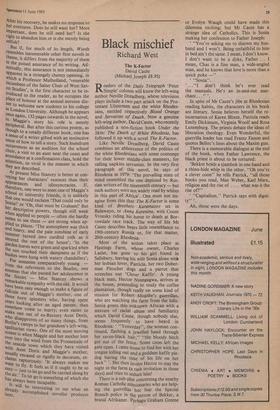Black mischief
Richard West
The K-Factor David Caute (Michael Joseph f8.95)
Readers of the Deily Telegraph 'Peter Simple' column will know the left-wing author Neville Dreadberg, whose television plays include a two part attack on the Pro- testant Ulstermen and the white Rhodes- ians, entitled respectively Blood Orange and Serviettes of Death. Now a genuine left-wing author, David Caute, who recently published a non-fiction book Under the Skin: The Death of White Rhodesia, has followed it up with a novel The K-Factor.
Like Neville Dreadberg, David Caute combines an abhorrence of the politics of the white Rhodesians with some contempt for their lower middle-class manners, for calling napkins serviettes. In the very first
paragraph of this novel, he says of Rhodesia in 1979: 'The prevailing state of mind resembled the one depicted by Rus- sian writers of the nineteenth century — but such authors were not widely read by whites in this part of Africa'. One must not im-
agine from this that The K-Factor is some kind of Brothers Karamazov set in Bulawayo, or Anna Karenina, with Count
Vronsky riding his horse to death at Bor- rowdale race track. The way of life Mr Caute describes bears little resemblance to 19th-century Russia or, for that matter, 20th-century Rhodesia.
Most of the action takes place at Hastings Farm, whose owner, Charles Laslet, has gone to his girl friend in Salisbury, leaving his wife Sonia alone with her lesbian lover, Patricia, her two Dober- man Pinscher dogs and a parrot that screeches out 'Clever Kaffir'. A young black man, Hector Nyangagwa, arrives at the house, pretending to study the coffee plantation, though really on some kind of mission for Robert Mugabe's guerrillas, who are watching the farm from the hills.
Sonia greets this unknown African with a mixture of racial abuse and familiarity which David Caute, though nobody else, seems frequently to have heard in Rhodesia: "Yesterday", the woman con- tinued, flashing a jewelled hand through her raven-black hair," "the bloody bitch got out of the fence. Some coon left the gate open. I came home to find her with her
tongue lolling out and a goddam kaffir pie- dog having the time of his life on her back" '. She then invites Hector to stay the night in the farm (a rash invitation in those days) and tries to seduce him!
There is a sub-plot concerning the nearby Roman Catholic missionaries who are help- ing the guerrillas but fear the Special Branch police in the person of Bekker, a brutal Afrikaner. Perhaps Graham Greene
or Evelyn Waugh could have made this dilemma exciting; but Mr Caute has a strange idea of Catholics. This is Sonia making her confession to Father Joseph: "You're asking me to disown my hus- band and I won't. Being unfaithful to him in bed ain't the same. I mean, I don't know. I don't want to be a dyke, Father ... I mean, Chas is a fine man, a wide-angled man, and he knows that love is more than a quick poke —" "Sonia".
... "I don't think he's ever read the manuals. He's an in-and-out mer- chant..." '.
In spite of Mr Caute's jibe at Rhodesian reading habits, the characters in his book are literary. Sonia believes herself the re- incarnation of Karen Blixen. Patricia reads Emily Dickinson, Virginia Woolf and Rosa Luxemburg. The priests debate the ideas of liberation theology. Even Wonderful, the guerrilla leader has read Frantz Fanon and quotes Belloc's lines about the Maxim gun. There is a memorable dialogue at the end of the book, when Father Lawrence, the black priest is about to be tortured: 'Bekker holds a sjambok in one hand and a rhino-hide whip in the other. "Oh you're a clever coon" he tells Patrick, "all those books you read, Max Weber, Karl Marx, religion and the rise of .... what was it the rise of?"
"Capitalism," Patrick says with digni- ty" '.
Ah, those were the days.










































 Previous page
Previous page